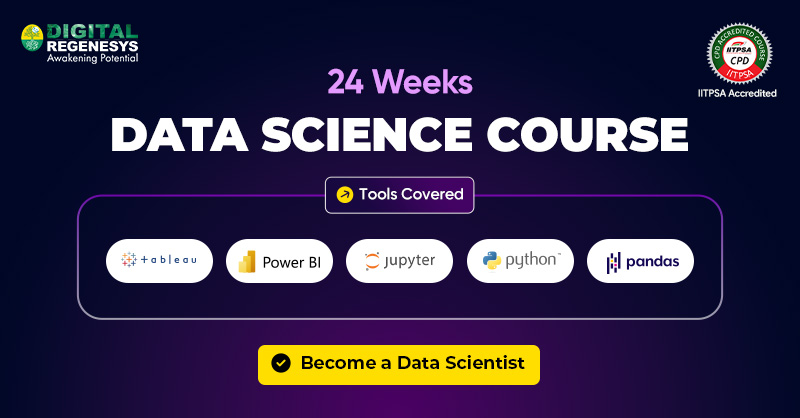Introduction to Data Science

Data is everywhere – from the messages we send, the purchases we make, to the social media platforms we scroll through daily. Organisations today collect vast amounts of information, but without proper analysis, this data remains meaningless. This is where data science comes in. Data science is the process of turning raw information into valuable insights that can guide decisions, predict trends, and solve real-world problems. It blends statistics, computer science, and domain expertise, making it one of the most dynamic and in-demand fields today.
Whether you are a student, professional, or simply curious about how businesses use data to make smarter choices, understanding data science is essential.
In this article, we will explore what data science is, why it matters, its components, tools, applications, and its future.
What is Data Science?
Data science is about using data to make better choices. It involves gathering, cleaning, studying, and interpreting information. The goal is to discover patterns, test ideas, and predict future outcomes.
Unlike simple reporting, which only shows what happened, data science goes deeper. It explains why something happened and helps forecast what might happen next. For instance, an e-commerce store can use data science to learn why customers abandon their carts and how to reduce it.
Read more on What is Data Science?- Know Why It is Important in Business!
Why is Data Science Important?
Every organisation today relies on data in some form. Without proper analysis, this information is wasted. Data science makes it possible to get value from data and use it to improve performance.
Here are some reasons why data science is so important-
- Better decisions- Businesses use data science to understand customer needs, monitor performance, and plan strategies. This reduces the risk of guesswork.
- Trend prediction- Looking at past data helps forecast future events. For example, predicting demand for products or identifying possible risks.
- Personalisation- Companies like Netflix or Spotify recommend shows or songs by studying user preferences. This creates a more personalised experience.
- Competitive edge- Organisations that understand their data can move faster than competitors. They spot opportunities earlier and adapt quickly.

Key Stages of Data Science
Data science is not a single step but a journey. Each stage builds on the previous one and helps transform raw information into insights that can guide decisions. Skipping a stage can weaken the quality of results, which is why the process is systematic and structured. From collecting data to monitoring results, every step is important.
The following are the key stages of data science-
- Data Collection- Gathering information from surveys, websites, transactions, sensors, or social media. Data may be structured (tables, spreadsheets) or unstructured (emails, videos).
- Data Cleaning- Raw data often contains errors, gaps, or duplicates. Cleaning ensures the dataset is accurate and ready for study.
- Analysis and Visualisation- Tools and methods are used to find trends, patterns, or relationships in the data. Visuals such as graphs or dashboards make the results easier to understand.
- Modelling and Machine Learning- Models are built to make predictions or automate decisions. For example, predicting loan defaults or spotting fraudulent activities.
- Deployment and Monitoring- Insights or models are used in real systems. Regular checks are done to make sure they remain accurate as new data comes in.
Read on How to Start Learning Data Science?- Check the Important Steps!
Tools and Technologies in Data Science
Data science makes use of many tools and technologies to handle information effectively. Each tool plays a different role, whether it is for coding, creating visuals, or building machine learning models. Data scientists often use a mix of these tools to complete their projects.
The table below shows some of the most common tools and their main uses-
|
Category |
Tools/Technologies |
Purpose/Use |
|
Programming Languages |
Python – with Pandas, NumPy, Scikit-learn R |
Python- General coding, data handling, machine learning R- Statistics and research |
|
Visualisation Tools |
Power BI, Tableau |
Create dashboards, reports, and interactive visuals |
|
Development Platforms |
Jupyter Notebook |
Write, test, and share code interactively |
|
Libraries & Frameworks |
Pandas, NumPy Matplotlib, Seaborn TensorFlow, PyTorch |
Data handling Charts and graphs Machine learning |
Read on Why Learn Data Science in SA Right Now- Top Reasons to Start Today here!
Data Science vs Related Fields
Data science is often mixed up with other fields like artificial intelligence, machine learning, and business intelligence. While these areas overlap, each has a unique focus. Understanding the differences helps clear common confusion about their roles and applications.
The table below highlights the key differences to make the distinction clearer-
|
Field |
Focus |
Key Difference from Data Science |
|
Artificial Intelligence (AI) |
Building systems that mimic human thinking and behaviour. |
AI creates intelligent systems, while data science analyses data to draw insights. |
|
Machine Learning (ML) |
A branch of AI that trains systems to learn from data. |
ML is a tool within data science. Data science also covers data collection, cleaning, and visualisation. |
|
Business Intelligence (BI) |
Examines past and present data to generate reports and dashboards. |
BI explains what has happened. Data science goes further by predicting future trends and outcomes. |
Also, read on Machine Learning vs Deep Learning vs AI- Understanding the Differences here!
Real-Life Uses of Data Science
The value of data science lies in its practical applications. It is used in almost every industry to solve problems, improve efficiency, and create better experiences. From healthcare to retail, its impact is visible in everyday life.
Here are some real-world examples of how data science is applied-
- Healthcare- Analysing patient records, predicting disease risks, and supporting personalised treatment.
- Finance- Detecting fraud, assessing credit risks, and helping investors make decisions.
- Retail and e-commerce- Recommending products, studying customer habits, and managing stock levels.
- Marketing and social media- Understanding customer behaviour, studying feedback, and running targeted campaigns.
- Transport and logistics- Planning routes, reducing delivery times, and predicting traffic.
The Future of Data Science
The role of data science is expanding every day. With more data being created, organisations are looking for better ways to use it. As a result, the demand for data science professionals is growing across industries worldwide. At the same time, new technologies are shaping the way data is handled.
Here are some key trends that will define the future of data science-
- Automated machine learning (AutoML)- Making model-building simpler for non-experts.
- AI integration- Using AI alongside data science for deeper insights.
- Ethical focus- More attention on privacy and fair use of data.
- Growing demand for skills- Data science remains one of the most sought-after careers.

Conclusion
Data science plays a vital role in today’s world by transforming raw data into meaningful insights that guide smarter decisions. From predicting patient outcomes in healthcare to detecting fraud in finance or improving customer experiences in retail, its applications are vast and impactful. As industries increasingly depend on data, the need for skilled professionals in this field continues to rise.
At Digital Regenesys, our Data Science course is designed to equip you with practical, real-world skills in data collection, analysis, and modelling. Whether you’re starting fresh or looking to advance your career, this course prepares you for a high-demand profession.
Enrol today with Digital Regenesys and take your first step into the future of data-driven careers.
Last Updated: 27 October 2025
